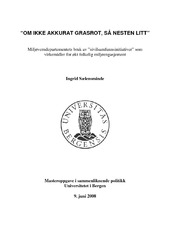"Om ikke akkurat grasrot, så nesten litt". Miljøverndepartementets bruk av "sivilsamfunnsinitiativer" som virkemidler for økt folkelig miljøengasjement
Abstract
This thesis studies how the Norwegian Ministry of the Environment tries to increase citizeninvolvement in environmental issues by using “grassroot” consumer organizations as a tool. Twosuch organizations are examined, namely Grønn Hverdag (Green Living) and 07-06-05 Tid forforandring (07-06-05 Time for Change). Both give the impression of being autonomousconsumer organisations but are essentially working to implement, rather than influence,environmental policy. Based on interviews with representatives of the organizations and of theMinistry, I attempt to examine the following: Are these top-down “grassroot” initiativescompatible with democratic principles, and are they able to strengthen citizens’ involvement withenvironmental issues?The study deals with this question by looking at the relation between the state and environmentalorganizations in Norway in a historical perspective. I argue that the two organizations are parts ofwhat might be regarded as a negative trend for democracy and political participation. First,increasing governmental control of voluntary organizations might transform many organizationsinto “arms of the state”. Second, public administration is participating in political debates in newways, partly at the expense of voluntary organizations and political parties. Further, thoughpolitical consumerism may be regarded as a legitimate tool for citizens to express politicalconcerns, I argue that these state-dominated organizations place too much responsibility forenvironmental problems on the individual consumer and too little on the political level. Theorganizations might therefore fail to address important societal questions, and this may also limittheir ability to gain popular support. This leads to the question of whether the focus on consensusand cooperation is always the best way for the political and administrative level to addressenvironmental concerns.
Publisher
The University of BergenCopyright
The authorCopyright the author. All rights reserved
